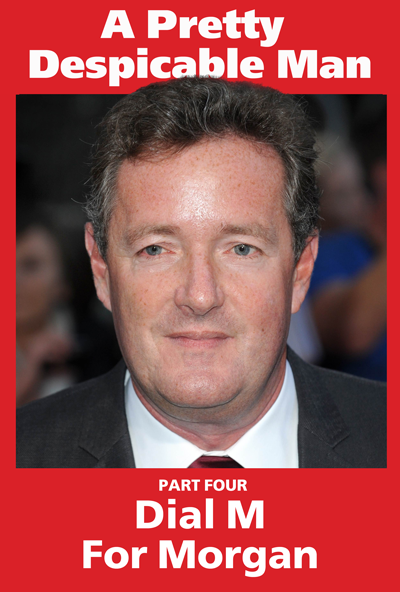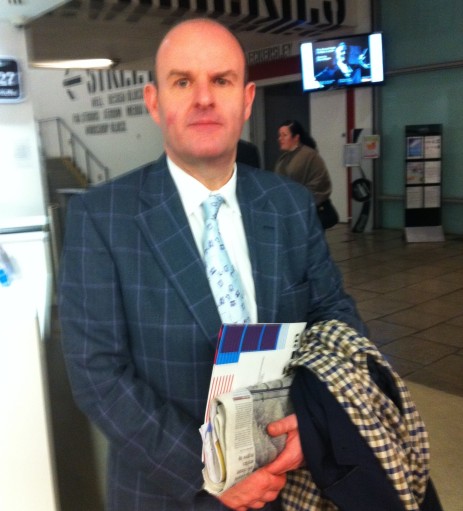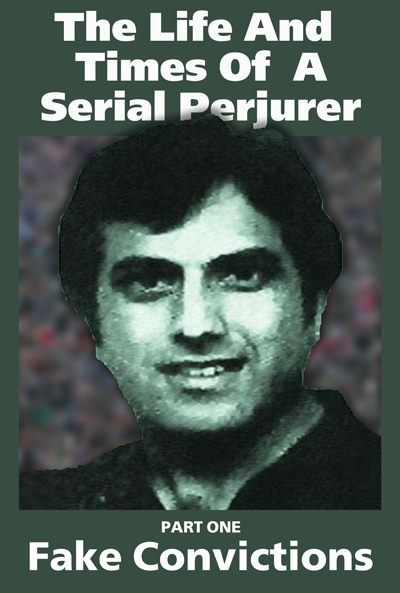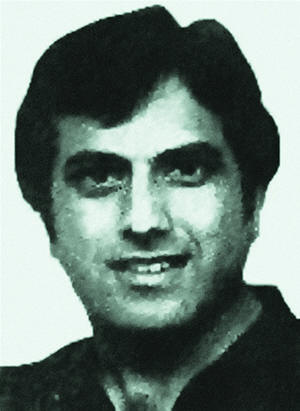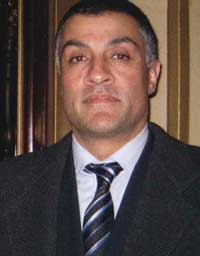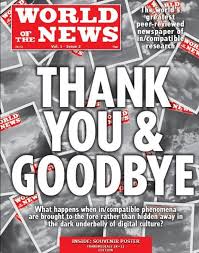FOR THE last four years Piers Morgan has been desperately trying to distance himself from the phone hacking scandal.
Twice he’s been interviewed under caution by detectives investigating phone hacking at the Daily Mirror when he was editor from 1995 to 2004.
Between 2001 and 2009 he made a series of incriminating statements widely interpreted as evidence he knew all about the practice.
Two of his protégés — Andy Coulson and Rebekah Brooks — have appeared in the dock at the Old Bailey.
Coulson went to gaol: Brooks was acquitted.
Morgan now insists he knew nothing:
“For the record … I have never hacked a phone, told anyone to hack a phone, or published any stories based on the hacking of a phone.”
But a Press Gang investigation reveals
— as early as 1997, the Daily Mirror was paying for “confidential enquiries” about telephone numbers
— in 1998 the paper was openly hacking the mobile phones of senior politicians
— a year later it spent nearly £6,000 on illegally obtained print-outs of calls made on individual phones
The evidence suggests the “dark arts” of illegal news-gathering — including phone hacking — were at the heart of Daily Mirror editorial policy when Morgan was editor.
♦♦♦
WHEN HE appeared on Desert Island Discs in 2009, Piers Morgan was challenged about phone hacking.
Presenter Kirsty Young asked him about dealing with people who listened to phone messages.
“People who tap people’s phones … how did you feel about that?”
Morgan didn’t deny the allegation:
“I’m quite happy … to have to sit here defending all these things I used to get up to …”
“I make no pretence about the stuff we used to do.”
But after the revelation in July 2011 that Rupert Murdoch’s journalists had hacked murdered schoolgirl Milly Dowler’s mobile phone, he changed his tune.
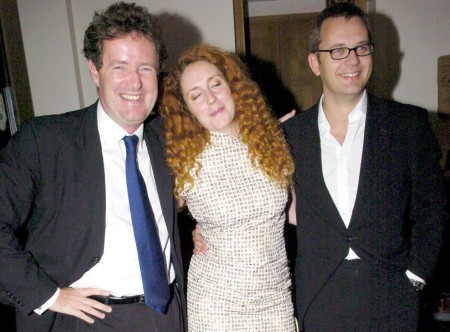
BUGGERS
PIERS MORGAN and his friends Rebekah Brooks and Andy Coulson at the height of their power in the early 2000s. Morgan edited the Mirror, Brooks the Sun and Coulson the News of the World. All three tabloids were hacking phones at that stage. Coulson and Brooks — long-term on-off lovers — were tried at the Old Bailey in 2014; Brooks was acquitted but Coulson was gaoled for 18 months. Piers Morgan was by far the most experienced of the three: he had been Coulson’s boss at the Sun’s show business column in the early 1990s and gave Rebekah Brooks her first big promotion while he was editor of the News of the World.
Picture: Richard Young / REX
When the American Daily Beast website resurrected his Desert Island Discs comments in 2011, Morgan insisted:
“For the record … I have never hacked a phone, told anyone to hack a phone, or published any stories based on the hacking of a phone.”
But, in fact, the Daily Mirror had printed an article based on phone hacking more than a decade earlier.
It was just as mobile phones were taking off — and Piers Morgan had been Daily Mirror editor for more than two years.
Early in 1998 one of the paper’s journalists in Dublin realised it was possible to access messages left on the mobile phones of senior Irish politicians.
Reporter Karl Brophy — based at the Irish Parliament — proceeded to listen to messages left on the phone of the Irish leader, Taoiseach Bertie Ahern.
He also successfully listened to messages left on the phones of other Cabinet ministers.
Brophy’s article — published as an “Exclusive” on Saturday, 18 April 1998 — went into great detail about how phone messages could be hacked:
“The phone tap can be operated by anyone who knows the number of the mobile phone they wish to listen in to.”
The article explained that mobile phones were sold with a standard password for stored messages that most people never changed.
“That means that anyone can listen in to another person’s messages by simply phoning into their electronic mailbox and dialling the digits 0000.”

SMOKING GUN
THE FRONT page story proving Piers Morgan’s Daily Mirror knew how to hack phones as early as April 1998. Reporter Karl Brophy provided a blueprint on how to listen to messages left on mobile phones. The article did not appear in mainland editions of the paper …
“Once they have done this the hacker has unlimited access to all the messages.”
The article was accompanied by an editorial.
This stated:
“If Richard Nixon had lived in Dublin he would have had no need for Watergate.”
“Instead of teams of bungling burglars all he would have needed was a mobile phone to tap into the thoughts of his political rivals.”
The piece continued:
“The Irish Mirror discovered this amazing security breach and chose not to keep it under wraps.”
“It is to be hoped the gap has been plugged before some unscrupulous eavesdropper has used it for sinister [purposes].”
There was to be no phone hacking scandal in Ireland.
♦♦♦
NOT A word of the story appeared in the mainland editions of the Daily Mirror.
This was despite the fact that several million people of Irish descent live in Britain — thousands of them Daily Mirror readers.
And the implications of the story for the British political establishment were obvious.
If British mobile phones were anything like their Irish counterparts, there was a potential security problem.
There were also strong connections between the Irish edition and the paper’s headquarters in London’s Canary Wharf.

SNITCH
SUN EDITOR Dominic Mohan told Lord Leveson about the Irish Mirror story in 2012. But the Inquiry team failed to understand its significance and didn’t enter the article as evidence — Piers Morgan was never questioned about it. Back in May 2002 Mohan was editor of the Sun’s “Bizarre” column when he sarcastically thanked Vodaphone’s lack of security for the success of Piers Morgan’s show business coverage in the Mirror … Photo: PA
The man in charge of the Irish Mirror was Craig Mackenzie, brother of Kelvin Mackenzie, Mirror Group deputy chief executive.
Kelvin Mackenzie was editor of the Sun when Piers Morgan started on the paper in the late 1980s.
Both Mackenzie brothers were friends of Morgan’s.
Press Gang spoke to Karl Brophy last week.
He said he wrote the story at a time when mobile phones were taking off.
“When you got your phone in those days it clearly … told you to change your PIN immediately,” he said.
“The thing was that most older people didn’t bother.”
“So, one day, I just started phoning mobiles of politicians and seeing if they had changed their PINs.”
“A lot hadn’t so I changed all the PINs of the ones who hadn’t to a single four digit number so nobody else could listen in.”
“I thought the fact that voice messages … of government ministers and advisers could be so easily accessed was rather serious – especially considering where we were in 1998 with the Peace Process …”
In fact, the historic Good Friday agreement had been signed a week earlier.
All the ministers Brophy hacked immediately changed their PIN numbers after he told the government what he’d done.
♦♦♦
FIFTEEN MONTHS later the Daily Mirror in London were told about security problems with mobile phones.
Welsh sales manager Steven Nott rang the paper in August 1999 about a flaw in Vodaphone’s system.
He talked to Mirror special projects editor Oonagh Blackman.
He told her that if people did not change the standard Vodaphone 3333 PIN number, anyone could dial in and listen to messages.
Nott claims that, initially, Blackman was enthusiastic but after 12 days told him the paper wasn’t interested.
The paper later sent him a £100 cheque with a statement saying it was in relation to “mobile phone scandal.”
Nott later told the Leveson Inquiry:
“I accused the Daily Mirror of keeping the phone hacking method for their own purposes.”
But, in addition to the Irish Mirror story, there’s evidence the paper’s journalists were already deeply involved in the “dark arts” of illegal news-gathering, including phone hacking.
♦♦♦
CENTRAL TO this operation was senior reporter Gary Jones and his dealings with a corrupt firm of private detectives.
Jones had been News of the World crime reporter when Piers Morgan edited the Sunday tabloid in 1994-1995.
Jones won the Press Gazette Reporter of the Year award in 1995 for his scoops.
One of the most dramatic was a story about anonymous calls being made by Princess Diana.
This was also one of the key stories in Piers Morgan’s career — it impressed Rupert Murdoch who liked big, international controversies.
Especially if it also involved an attack on the British establishment he despised.

GARY “DARK ARTS” JONES
A KEY LIEUTENANT throughout Piers Morgan’s editorship, Jones was the Mirror mastermind when it came to illegal news-gathering. He’d been the News of the World crime reporter when Piers Morgan edited the Sunday paper in 1994-1995. Jones — who has featured in many Press Gang articles — does not answer our emails.
This worldwide exclusive was based on a leaked investigation report from Scotland Yard.
Press Gang — in the article Whodunnit? — revealed Piers Morgan almost certainly authorised an enormous payment to a recently retired senior police officer for access to the report.
The sum is believed to have been in the hundreds of thousands of pounds.
Piers Morgan was appointed Daily Mirror editor in 1995 and Gary Jones joined him the following year.
Documentary evidence shows that by October 1997 Gary Jones was responsible for organising much of the paper’s clandestine operations.
Jones was using the controversial detective agency Southern Investigations to illegally access information.
The agency had also been working for the News of the World from the late 1980s — including the period Piers Morgan was editor.
The firm was run by private eye Jonathan Rees.
Rees had been a suspect in the murder of his partner Daniel Morgan in 1987.

CORRUPT DETECTIVE
THE PRIVATE eye Jonathan Rees who provided the Daily Mirror with a hoard of confidential information, much of it obtained from bent police officers. He later stood trial for the murder of his partner Daniel Morgan but the case collapsed in 2011. A fuller account of his activities can be found in the Press Gang series The No 1 Corrupt Detective Agency.
Photo: PA
Daniel Morgan’s place as Rees’ partner was taken by former Scotland Yard detective sergeant Sid Fillery.
Fillery had been part of the homicide team investigating the murder until his superiors realised he was a friend of Rees.
Southern Investigations provided Gary Jones and the Mirror with one scoop after another.
The evidence comes from a secret operation — Two Bridges — mounted by anti-corruption detectives at Scotland Yard.
They bugged the offices of Southern Investigations and, in September 1999, raided the firm and many of its network of informants.
From the files generated by this operation, Press Gang has already shown that
— in September 1998 phone hacking may have played a part in an exclusive about news presenter Kirsty Young’s new relationship with millionaire businessman Nick Young. In our story Down In The Gutter we showed that Southern Investigations followed Young over several days. The paper’s reluctance to publish the story straight away suggests the original source of the story may have come from phone hacking ,,,

KIRSTY YOUNG
WHEN THE Desert Island Discs presenter interviewed Piers Morgan in 2009, he appeared to admit the Daily Mirror had been involved in phone hacking. What Young didn’t know is that she’d been a target of Piers Morgan’s paper in 1998 when she began a new relationship. The story may have resulted from phone hacking …
Photo: PA
— in October 1998 Gary Jones and Oonagh Blackman published an article revealing the confidential mortgage details of members of the committee which set interest rates. In our article Assault On The Bank Of England we showed that Southern Investigations had illegally “blagged” the information from banks and building societies. The firm sent one set of doctored invoices to the Daily Mirror accounts department but Press Gang obtained a confidential statement sent to Gary Jones marked “For Your Information Only” which reveals the true nature of the operation.
But this is just the tip of the iceberg.
Invoices generated by Southern Investigations were usually heavily disguised.
“Confidential enquiries” was the phrase used to cover up illegal activity ordered by Gary Jones on behalf of the Mirror.
Four of these invoices include parts of telephone numbers.
The first was in October 1997 — long before the Irish Mirror published its piece.
Southern Investigations was billing Jones for “confidential enquiries” relating to a telephone number showing just the dialling code 01480 (Huntingdon).
In 1998 there were three more invoices — again with only part of the number given.
The sums involved — around £300 each — suggest these “confidential enquiries” involved print-outs of calls made from the numbers.
Southern Investigations had people inside phone companies who made copies of itemised phone calls.
Just how corrupt the relationship between Gary Jones and Jonathan Rees actually was is shown by a dramatic row which took place in July 1999.
♦♦♦
IT’S TUESDAY, 6 July 1999 at the offices of Southern Investigations in Thornton Heath, South London.
Jonathan Rees is busy.
Some of his work is legitimate routine bread and butter stuff like serving writs and tracing people.
But increasingly his time is taken up with obtaining confidential information and selling it to newspapers like the News of the World and the Mirror Group.
Unknown to him, every word he says today will be recorded.
A bug has been planted in the building by anti-corruption detectives from Scotland Yard as part of Operation Two Bridges.
Two Bridges has two aims.
One is to generate information about the murder of Daniel Morgan in 1987.
The second is part of an attempt to prevent Southern Investigations from corrupting police officers.
An internal Scotland Yard document — later leaked to the BBC Home Affairs correspondent Graeme McLagan — spelt out the concerns.
Rees — and his partner, ex Metropolitan Police detective Sid Fillery:
“.. are alert, cunning and devious individuals who have current knowledge of investigative methods and techniques which may be used against them.”

“CUNNING AND DEVIOUS”
A CHARGE against former Scotland Yard detective Sid Fillery — perverting the course of justice in connection with the murder of Daniel Morgan— was dropped in 2010. By then, though, Fillery already had a criminal record — he was convicted of making and possessing indecent images of children in 2003. He now helps run the Lion public house in the village of Thurne in the Norfolk Broads.
Photo: PA
“They use some of the techniques in their own daily activities.”
“Such is their level of access to individuals within the police, through professional and social contacts, that the threat of compromise to any conventional investigation against them is constant and very real.”
But on that Tuesday — 6 July 1999 — Rees is oblivious to the fact that his office is bugged.
When he rings Gary Jones at the Daily Mirror to discuss invoices, he believes the conversation is private.
Rees says he’s faxing through a full list of invoices for the work done for the Mirror Group (including the Mirror, People and the Sunday Mirror) that year.
The total is £16,991 for the five months.
The list includes nearly £6,000 for the illegal supply of itemised print-outs of calls made from phones.
Rees says
“… when it comes through you’ll see the invoice, with lots of stars next to them, and roughly billed at about £300 odd — which is print-outs.“
Rees tells Jones there are 19 of these print-outs with the initials of the reporters who ordered them, with “G.J. being you.”
Later that day Rees and Jones have another discussion about the lack of detail on the invoices relating to these print-outs.
Jones is under pressure from the paper’s accounts department to provide more information on the Southern Investigations invoices.
Rees loses his temper:
“Well they are printouts …”
“ … this is tiresome, fucking tiresome …”
“ … we are not going to put the numbers in there because what we are doing is illegal …”
“ … I don’t want people coming in and nicking us for criminal offence, you know.”
When this conversation takes place, Gary Jones is sitting at his desk in the Daily Mirror newsroom on the 22nd floor of the skyscraper at Canary Wharf.
A few yards away is the editor’s corner office.
Can Piers Morgan have known absolutely nothing about Gary Jones’ illegal activities?
♦♦♦
OPERATION TWO BRIDGES comes to an abrupt end in September 1999.
The bug in Southern Investigations reveals Rees has a client fighting his estranged wife for custody of their child.
Rees agrees to organise a conspiracy with a corrupt police officer to plant cocaine in the wife’s car.
The plan is to saddle her with a drugs conviction — so proving her to be an unfit mother.
The police pounce on the conspirators.
Rees and the client are given seven year prison sentences.
The corrupt police officer is gaoled for five.
Sid Fillery is not involved.

SURVEILLANCE OPERATION
TWO BRIDGES officers photographed Jonathan Rees outside the offices of Southern Investigations in south London. Detectives were watching the building while others listened in on the bug secretly placed inside …
Photo: PA
When police closed in on the conspiracy, they also arrested many of those suspected of being involved in illegal news-gathering.
One of them was Doug Kempster, a reporter with the Sunday Mirror, part of the Mirror group.
An internal police report shows some senior police officers wanted a conviction:
“It is likely that journalists and private investigators who actively corrupt serving officers would receive a long custodial sentence if convicted.”
“There will be a high level of media interest in this particular investigation, especially when involving journalists.”
“The Metropolitan Police will undoubtedly benefit if a journalist is convicted of corrupting serving police officers.”
“This will send a clear message to members of the media to consider their own ethical and illegal involvement with employees of the Met in the future.”
Police submitted a file to the Crown Prosecution Service which decided not to charge the reporter.
Kempster’s arrest sent shock waves around senior management at the Mirror Group.
But it did not stop illegal news-gathering at Piers Morgan’s Daily Mirror.
With Jonathan Rees in gaol, the paper turned to another private eye — Steve Whittamore.
By the time he was arrested for breaches of the Data Protection Act in 2003, the paper had spent at least £92,000 with the private eye.
In our article Whodunnit? we exclusively revealed that one of the Mirror reporters who apparently commissioned work from Whittamore was Tom Newton Dunn.

TOM NEWTON DUNN
THE CURRENT political editor of The Sun, Tom Newton Dunn was a young Mirror reporter when he allegedly ordered an unlawful criminal record check.
Photo: PA
Today, he’s the political editor of The Sun.
In the early 2000s Dunn’s name was recorded by Whittamore as the Mirror contact for a criminal record check of a parliamentary candidate.
This was Adrian Flook, who later became Tory MP for Taunton.
Newton Dunn does not answer our emails.
♦♦♦
IS IT possible Piers Morgan didn’t know what was going on at the Mirror when he was editor?
During the Leveson Inquiry journalist James Hipwell gave evidence about phone hacking when he worked at the paper between 1998 and 2000.
Hipwell was a financial journalist and worked close to the paper’s showbiz reporters.
He said they hacked openly and frequently.
Hacking was “a bog-standard journalistic tool for gathering information.”
He had no direct evidence Piers Morgan was involved but added:
“I would say that it is very unlikely that he didn’t know it was going on …”
“The newspaper was built around the cult of Piers.”
“He was the newspaper.”
‘Nothing happened at the newspaper without him knowing.”
When he gave evidence, Morgan was contemptuous of Hipwell.
Hipwell had been gaoled for six months for insider dealing in 2000 while working for the paper’s City Slickers column.
He bought shares in a company owned by Alan Sugar before they were tipped by the column.

JAMES HIPWELL
A FORMER Daily Mirror financial reporter in the late 1990s, Hipwell says phone hacking was “bog-standard” among the paper’s show-business journalists. Piers Morgan claims Hipwell was not a credible witness because he had a grudge against him — but several judges preferred Hipwell’s testimony to Morgan’s …
Photo: PA
The shares rocketed in value the next day.
Piers Morgan also bought shares but always insisted he didn’t know they were going to be the subject of a Mirror article.
In a statement to Leveson, Morgan wrote:
“I note that Mr Hipwell is a convicted criminal who changed his story on a number of occasions during the City Slickers investigation, in part to wrongfully implicate me.”
“I believe any testimony he gives to be inherently unreliable.”
Leveson, though, found Hipwell a credible witness:
“… the Inquiry does conclude that the practice of phone hacking may well have taken place at the Mirror titles at the time Mr Hipwell was working there …”
Leveson also questioned Piers Morgan about his comment after the 2007 gaoling of News of the World royal correspondent Clive Goodman for hacking royal phones.
Morgan had been Goodman’s editor at the News of the World in 1994-1995.
“… I feel a lot of sympathy for a man who has been the convenient fall guy for an investigative practice that everyone knows was going on at every paper in Fleet Street for years.”
Morgan told Leveson he was talking about the “rumour mill” at the time — and that phone hacking wasn’t happening at the Daily Mirror.
Leveson was caustic:
“This was not, in any sense at all, a convincing answer.”
“Overall, Mr Morgan’s attempt to push back from his own bullish statement to the Press Gazette was utterly unpersuasive.”
♦♦♦
MORE AND more evidence is emerging about the “dark arts” at the Daily Mirror.
So far Operation Golding, the Scotland Yard operation into phone hacking at the Mirror Group, has seen 15 journalists — including Piers Morgan — questioned under caution.
The investigation continues.
Scores of civil claims are also generating large amounts of information.
In May Mr Justice Mann ordered the Mirror group to pay eight victims a massive £1.2 million in damages.

MIRROR, MIRROR
THERE ARE two Piers Morgans. There’s the brash tabloid editor with the big mouth who’s made a large number of comments making it clear he knew all about the “dark arts” when he was the paper’s editor. And then there’s the innocent journalist who claims he’s been misunderstood — he’s actually a high-minded, ethical editor. If these terrible things happened on his watch, he certainly didn’t authorise them …
Photo: PA / Graphic: Terry Evans, Wheelbarrow Studios
Six were victims of the Daily Mirror during Piers Morgan’s tenure — including the actress Sadie Frost and the footballer Paul Gascoigne.
The judgment also revealed that the Mirror papers:
“admitted paying over £2.25 million (in over 13,000 invoices) to certain named private eyes in the years from 2000 to 2007.”
Mr Justice Mann noted that the Mirror’s legal team acknowledged:
“that ‘an unquantifiable but substantial’ number of the inquiries made of the agents is likely to have been to obtain private information that could not be obtained lawfully.”
♦♦♦
© Press Gang
Published: 29 June 2015
♦♦♦
NOTES
1 Many of the examples where Piers Morgan is alleged to have made statements indicating he knew about phone hacking have been left out of this article. They are all well known and including them would have made the piece too long.
2 There are reporting restrictions in the recent civil case against the Mirror group. Mr Justice Mann ordered the names of several journalists should be redacted — apparently because they are the subject of active police inquiries.
3 A more detailed analysis of Mr Justice Mann’s decision will be included in a planned article — The Mirror: Crack’d From Side To Side — about the group’s disastrous management of the scandal.
4 Since the Mann judgment opens the way to everyone targeted by the Daily Mirror, a full list of all those whose names are included in the Southern Investigations invoices will be added to this post later. They include, for example, the environmental activist Daniel “Swampy” Hooper as well as scores of ordinary people …
♦♦♦
COMING UP
A SLICKER FULL OF LIES
THE STORY of Piers Morgan’s involvement in the “Slickergate Affair” of 2000 makes sobering reading. There is evidence that Morgan sacrificed two of his journalists to save his own skin — and that senior Mirror Group managers were in on the plot. The attempt to spin the truth of what happened even involved lying to Lord Leveson … Part five of A Pretty Despicable Man tells the story of a deliberate corporate cover-up …
♦♦♦
JOIN THE GANGBUSTERS …
THERE’S A need for a trustworthy website to expose rogue reporters. Press Gang is that outlet — fearless and fair. Join us by becoming a gangbuster and help pay some of our expenses. Just hit the button …
CORRECTIONS
Please let us know if there are any mistakes in this article — they’ll be corrected as soon as possible.
RIGHT OF REPLY
If you have been mentioned in this article and disagree with it, please let us have your comments. Provided your response is not defamatory we’ll add it to the article.
